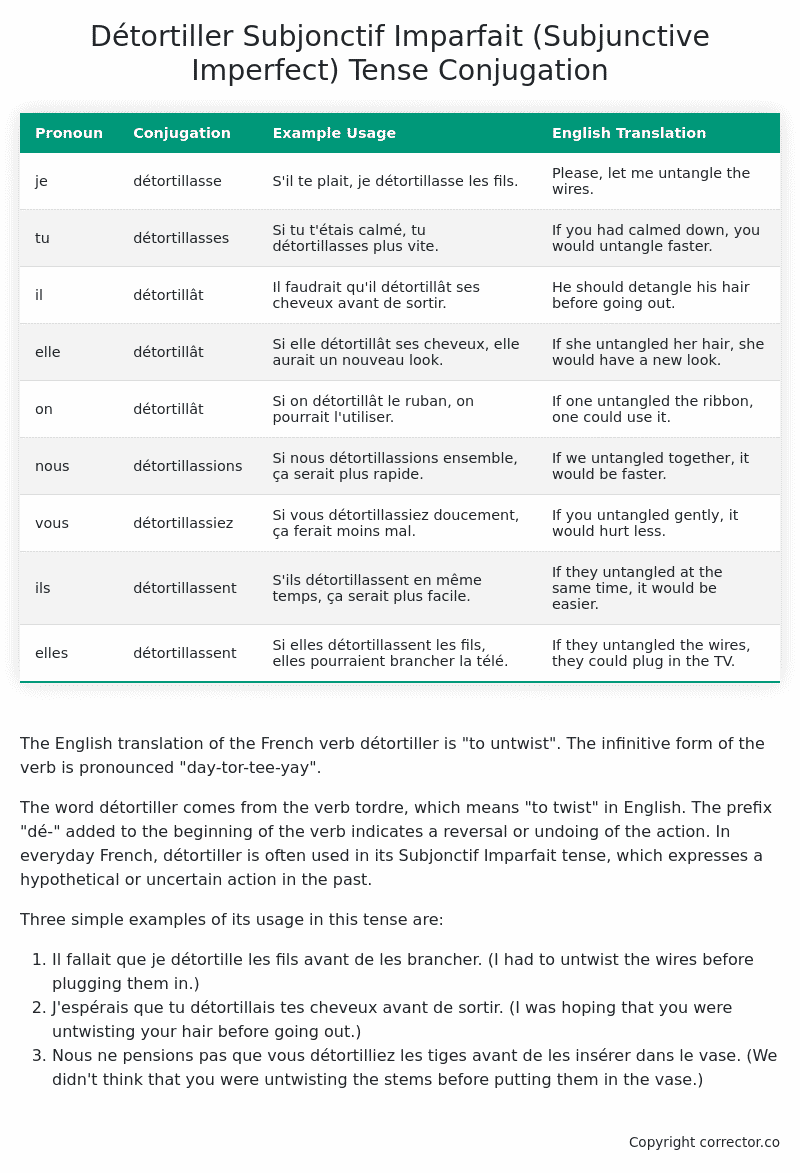Subjonctif Imparfait (Subjunctive Imperfect) Tense Conjugation of the French Verb détortiller
Introduction to the verb détortiller
The English translation of the French verb détortiller is “to untwist”. The infinitive form of the verb is pronounced “day-tor-tee-yay”.
The word détortiller comes from the verb tordre, which means “to twist” in English. The prefix “dé-” added to the beginning of the verb indicates a reversal or undoing of the action. In everyday French, détortiller is often used in its Subjonctif Imparfait tense, which expresses a hypothetical or uncertain action in the past.
Three simple examples of its usage in this tense are:
- Il fallait que je détortille les fils avant de les brancher. (I had to untwist the wires before plugging them in.)
- J’espérais que tu détortillais tes cheveux avant de sortir. (I was hoping that you were untwisting your hair before going out.)
- Nous ne pensions pas que vous détortilliez les tiges avant de les insérer dans le vase. (We didn’t think that you were untwisting the stems before putting them in the vase.)
Table of the Subjonctif Imparfait (Subjunctive Imperfect) Tense Conjugation of détortiller
| Pronoun | Conjugation | Example Usage | English Translation |
|---|---|---|---|
| je | détortillasse | S’il te plait, je détortillasse les fils. | Please, let me untangle the wires. |
| tu | détortillasses | Si tu t’étais calmé, tu détortillasses plus vite. | If you had calmed down, you would untangle faster. |
| il | détortillât | Il faudrait qu’il détortillât ses cheveux avant de sortir. | He should detangle his hair before going out. |
| elle | détortillât | Si elle détortillât ses cheveux, elle aurait un nouveau look. | If she untangled her hair, she would have a new look. |
| on | détortillât | Si on détortillât le ruban, on pourrait l’utiliser. | If one untangled the ribbon, one could use it. |
| nous | détortillassions | Si nous détortillassions ensemble, ça serait plus rapide. | If we untangled together, it would be faster. |
| vous | détortillassiez | Si vous détortillassiez doucement, ça ferait moins mal. | If you untangled gently, it would hurt less. |
| ils | détortillassent | S’ils détortillassent en même temps, ça serait plus facile. | If they untangled at the same time, it would be easier. |
| elles | détortillassent | Si elles détortillassent les fils, elles pourraient brancher la télé. | If they untangled the wires, they could plug in the TV. |
Other Conjugations for Détortiller.
Le Present (Present Tense) Conjugation of the French Verb détortiller
Imparfait (Imperfect) Tense Conjugation of the French Verb détortiller
Passé Simple (Simple Past) Tense Conjugation of the French Verb détortiller
Passé Composé (Present Perfect) Tense Conjugation of the French Verb détortiller
Futur Simple (Simple Future) Tense Conjugation of the French Verb détortiller
Futur Proche (Near Future) Tense Conjugation of the French Verb détortiller
Plus-que-parfait (Pluperfect) Tense Conjugation of the French Verb détortiller
Passé Antérieur (Past Anterior) Tense Conjugation of the French Verb détortiller
Futur Antérieur (Future Anterior) Tense Conjugation of the French Verb détortiller
Subjonctif Présent (Subjunctive Present) Tense Conjugation of the French Verb détortiller
Subjonctif Passé (Subjunctive Past) Tense Conjugation of the French Verb détortiller
Subjonctif Imparfait (Subjunctive Imperfect) Tense Conjugation of the French Verb détortiller (this article)
Conditionnel Présent (Conditional Present) Tense Conjugation of the French Verb détortiller
Conditionnel Passé (Conditional Past) Tense Conjugation of the French Verb détortiller
L’impératif Présent (Imperative Present) Tense Conjugation of the French Verb détortiller
L’infinitif Présent (Infinitive Present) Tense Conjugation of the French Verb détortiller
Struggling with French verbs or the language in general? Why not use our free French Grammar Checker – no registration required!
Get a FREE Download Study Sheet of this Conjugation 🔥
Simply right click the image below, click “save image” and get your free reference for the détortiller Subjonctif Imparfait tense conjugation!

Détortiller – About the French Subjonctif Imparfait (Subjunctive Imperfect) Tense
Formation
Common Everyday Usage Patterns
Interactions with Other Tenses
Subjonctif Présent
Indicatif Passé Composé
Conditional
Conditional Perfect
Summary
I hope you enjoyed this article on the verb détortiller. Still in a learning mood? Check out another TOTALLY random French verb conjugation!


